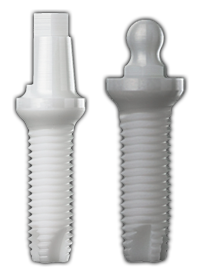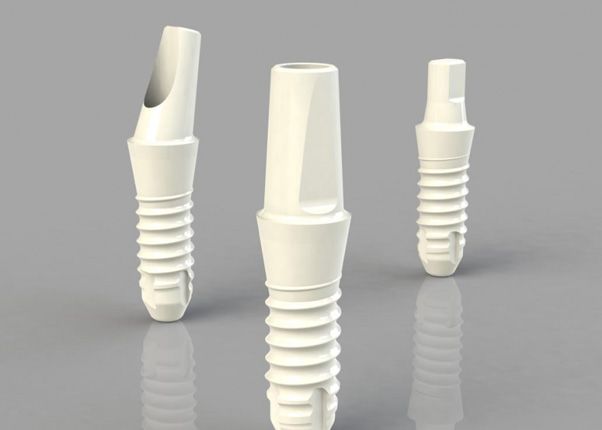Zirconia (metal-free) artificial dental roots – Zirconia (ZrO2) implants
Swiss dental company hopes to revolutionize dentistry with zirconium oxide ceramic implants
Halifax, MA – In the US approximately 500,000 artificial dental roots are implanted every year. First a hole is drilled in the jawbone under the gap and a metal pin made from titanium is inserted into this hole. After the pin has united with the bone – a process that takes several months – a ceramic dental crown can then be placed on it using additional metallic connecting pieces.
The Swiss company Z-Systems AG is convinced, however, that this method of dental implantation will be replaced in just a few years – at least a significant market share: “We expect, as do other experts too, in the field, that over the next several years less patients will accept metal implants.” In the artificial teeth business there is already a big acceptance of ceramics. Z-Systems AG has developed an alternative to standard titanium dental implants: artificial roots made exclusively of ceramic zirconium oxide which are much harder, and which have more flexural strength than titanium. Z-Systems implants have already successfully been placed more than 16,000 times. It is also the first FDA approved metal-free ceramic implant system available in the United States.

High-performance zirconium oxide ceramics have been used in medicine for years, for artificial hip joints, implanted medication applicators, dental crowns and bridges, among other things. Before Z-Systems, no one had ventured to use it as a dental implant material of the latest generation. After the initial success and the first prototypes placed in 2000, Z-Systems was founded in 2004, including the certification for Europe. After receiving the US FDA approval Z-Systems started its business in the US.
Zirconium oxide is much closer in composition to natural teeth than titanium, which was used up to now, explained the manger of the US Z-Systems team, based in Massachusetts. After implantation, the soft tissue grows up on the ceramic implant as it does on a natural tooth. In addition, the risk of inflammation is markedly reduced with the new material. Amazingly, in the question of inflammation (plaque), the artificial ceramic teeth are even better for the gums than healthy teeth.
The special Z-Systems Zirconia ceramic has a three times greater flexible strength than titanium. The terms “thin” and “brittle” that come to mind for ceramic do not apply to this high-tech ceramic. This specially produced Z-Systems ceramic is so hard that knives made from it can even cut steel. It is used, for example, in the heat shields for the NASA space shuttles and in the brake pads of sports cars.
The biocompatible ceramic implants are made up of one single piece, and include the anchor portion that goes in the bone. This means they can be implanted in just one operation. In contrast, a total of three sessions are required for conventional titanium systems.
Another advantage of ceramic implants is their color which is bright white. Of course, implants are normally covered by the gums and cannot be seen. But if a patient develops periodontitis over the years and the gums recede, a light-colored ceramic is more aesthetically pleasing than a shining metallic bolt, and gums that have thinned will always seem light-coloured.
Metal free oriented dentists all over the world estimate that around one-half of one percent of all patients have an allergic reaction or sensitivity to metals. Because of its free electrons, titanium can be involved in metabolic processes, which, in rare cases, can result in adverse reactions. In contrast, zirconium oxide has proven to be totally bio-inert. There are no known allergic reactions to zirconium ceramic.
However, it is much more complicated to produce zirconium oxide implants than titanium ones. It is easier to process titanium and hence the manufacturing costs. “In contrast, it is at least 10 times more expensive to produce ceramic implants,” explains the US president of Z-Systems, since the extremely hard ceramic can only be worked on using diamond instruments. Despite this, when all is said and done, it is less expensive to implant ceramic teeth than it is to use the titanium method because it takes the surgeon and dentist less time.


